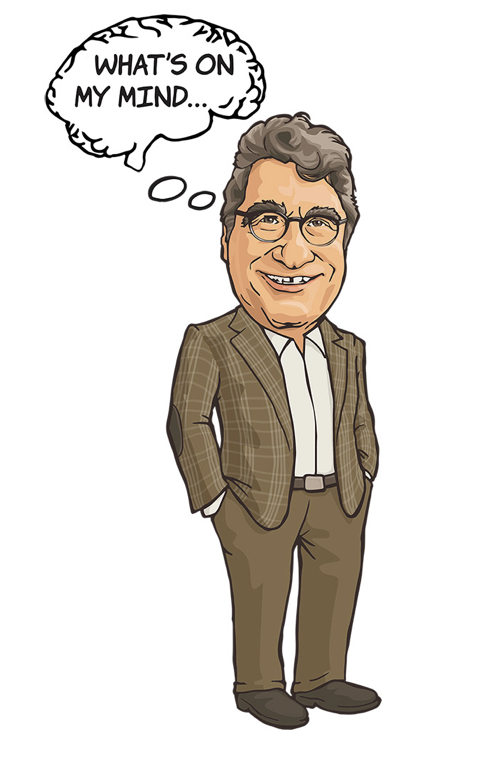 I was thrilled to hear April Ryan give the 2019 Martin Luther King Jr. Commemorative Series keynote address in Langford Auditorium on Monday night. As a White House correspondent who has covered four different presidencies, Ms. Ryan reflected on the Civil Rights Act, the 1965 march from Selma to Montgomery, and other key chapters in our nation’s history. Perhaps most importantly, she also spoke to what drove progress for each of those events: valuing humanity—the wholeness of the American people—above all else. Much like Dr. King, Ms. Ryan showed that speaking up, speaking boldly and advocating for our beliefs is not just the best way to bring people together; it is the only way.
I was thrilled to hear April Ryan give the 2019 Martin Luther King Jr. Commemorative Series keynote address in Langford Auditorium on Monday night. As a White House correspondent who has covered four different presidencies, Ms. Ryan reflected on the Civil Rights Act, the 1965 march from Selma to Montgomery, and other key chapters in our nation’s history. Perhaps most importantly, she also spoke to what drove progress for each of those events: valuing humanity—the wholeness of the American people—above all else. Much like Dr. King, Ms. Ryan showed that speaking up, speaking boldly and advocating for our beliefs is not just the best way to bring people together; it is the only way.
Aligning with the series theme of “Our Lives. Our Movements. Our Responsibilities,” Ms. Ryan’s talk was the perfect punctuation mark to a week brimming with events in honor of Dr. King, and the themes of advocacy, service, equality and justice for which he stood. It was inspiring to see so many students take part in the occasion—from the student committee members who were instrumental in planning this year’s keynote, to student leaders at the community-wide Day of Service, to those who shaped the dialogue through volunteering, marching or engaging in thoughtful conversations. Also including the Nashville Freedom Ride led by longtime local civil rights leader Kwame Lillard and Vanderbilt teach-ins covering Black Lives Matter, Islamophobia and other pressing topics of today, our MLK programming underscored not only the history of oppression and its present-day manifestations that we must address, but the power of dialogue, compassion and open-mindedness in forging change.
In my mind, the lectures, panels and events we host at Vanderbilt are not just supplements to a classroom education. Much more critically, they are part of our responsibility—as educators—to create and deploy ideas, to foster civil discourse, to loudly ask the questions that must be asked. As a university, we are uniquely positioned to have the types of difficult but essential conversations that happen in few other places today.
Dr. King was a part of creating that discourse at Vanderbilt when he spoke here in April of 1967—less than one year before his death—as part of our Impact Symposium. Then in its fourth year, the symposium featured Dr. King, poet Allen Ginsburg, civil rights activist Stokely Carmichael and segregationist U.S. Sen. Strom Thurmond, all of whom spoke in Memorial Gymnasium within a 24-hour period. Among the speakers that weekend 52 years ago, Dr. King’s words resonate the loudest today, echoing against the backdrop of an enormous American flag that we still hold dear on this campus.
In 1967, the very notion of Vanderbilt hosting these politically charged speakers, particularly those calling for integration and social justice, was as contested as it was radical. Some community members were outraged, viewing the symposium and its confluence of ideas as a threat to security, serenity or—as one alum put it in a letter to then-Chancellor Alexander Heard—the “very safety of property and human life.” But Chancellor Heard defended the event and the need for a space at Vanderbilt where injustices could be challenged, where new ideas and perspectives could flow freely.
Vanderbilt has continued to advocate for such open forums, and to exercise a similar boldness in inviting great minds—such as Ms. Ryan—to our campus. More than 50 years after engaging Dr. King, the Impact Symposium continues to thrive and has gone on to feature a spectrum of pivotal viewpoints: Robert F. Kennedy Jr. in 1968, Margaret Thatcher in 1996, Madeleine Albright in 2009 and Colin Powell in 2014, to name only a few.
Through the Impact Symposium, the Chancellor’s Lecture Series, the McGee Public Policy Lecture Series and keynotes from Equity, Diversity and Inclusion—among many other programs—we have heartily welcomed a diverse roster of speakers. Consequently, we also have welcomed a range of complex dialogues, difficult questions and conflicting viewpoints—all of which we must continue to seek out and embrace.
Vanderbilt University was founded 146 years ago during a time of great national division. The hope was that this university would “contribute to strengthening the ties which should exist between all sections of our common country.” Dr. King had a similar vision for our country—one that was not yet fully realized when he came to our campus. In the 1960s, we had a long way to go, and make no mistake—we still do.
We must not only take this truth in stride, but make pro-active strides towards positive social change. We must continue to bring speakers of different backgrounds and different perspectives to our campus. We must defend academic freedom among our faculty. We must create safe spaces for students to stand up for their own rights and the rights of others. We must listen to each other and merge new ideas with those we already hold. We must ensure—collectively and perpetually—that the conversation never ends.